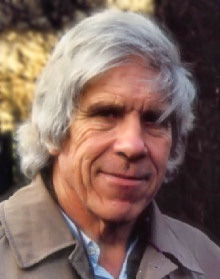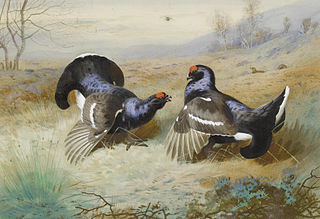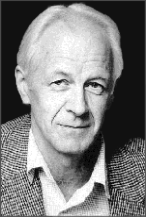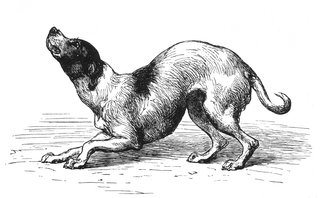
Ethology is the scientific study of animal behaviour, usually with a focus on behaviour under natural conditions, and viewing behaviour as an evolutionarily adaptive trait. Behaviourism as a term also describes the scientific and objective study of animal behaviour, usually referring to measured responses to stimuli or to trained behavioural responses in a laboratory context, without a particular emphasis on evolutionary adaptivity. Throughout history, different naturalists have studied aspects of animal behaviour. Ethology has its scientific roots in the work of Charles Darwin (1809–1882) and of American and German ornithologists of the late 19th and early 20th century, including Charles O. Whitman, Oskar Heinroth (1871–1945), and Wallace Craig. The modern discipline of ethology is generally considered to have begun during the 1930s with the work of Dutch biologist Nikolaas Tinbergen (1907–1988) and of Austrian biologists Konrad Lorenz and Karl von Frisch (1886–1982), the three recipients of the 1973 Nobel Prize in Physiology or Medicine. Ethology combines laboratory and field science, with a strong relation to some other disciplines such as neuroanatomy, ecology, and evolutionary biology. Ethologists typically show interest in a behavioural process rather than in a particular animal group, and often study one type of behaviour, such as aggression, in a number of unrelated species.

Ecology is the study of the relationships between living organisms, including humans, and their physical environment. Ecology considers organisms at the individual, population, community, ecosystems, and biosphere level. Ecology overlaps with the closely related sciences of biogeography, evolutionary biology, genetics, ethology and natural history. Ecology is a branch of biology, and it is not synonymous with environmentalism.

William Donald Hamilton was a British evolutionary biologist, widely recognised as one of the most significant evolutionary theorists of the 20th century.

The redpolls are a group of small passerine birds in the finch family Fringillidae, which have characteristic red markings on their heads. They are placed in the genus Acanthis. The genus name Acanthis is from the Ancient Greek akanthis, a name for a small now-unidentifiable bird.

The common redpoll or mealy redpoll is a species of bird in the finch family. It breeds somewhat further south than the Arctic redpoll, also in habitats with thickets or shrubs.

The lesser redpoll is a small passerine bird in the finch family, Fringillidae. It is the smallest, brownest, and most streaked of the redpolls. It is sometimes classified as a subspecies of the common redpoll but has recently been split from that species by the British Ornithologists' Union. It is native to Europe and has been introduced to New Zealand. Many birds migrate further south in winter, but the mild climate means that it can be found all year round in much of its range, and may be joined by the other two redpoll species in winter.

Group selection is a proposed mechanism of evolution in which natural selection acts at the level of the group, instead of at the level of the individual or gene.
Evolutionary game theory (EGT) is the application of game theory to evolving populations in biology. It defines a framework of contests, strategies, and analytics into which Darwinian competition can be modelled. It originated in 1973 with John Maynard Smith and George R. Price's formalisation of contests, analysed as strategies, and the mathematical criteria that can be used to predict the results of competing strategies.

Allan Charles Wilson was a Professor of Biochemistry at the University of California, Berkeley, a pioneer in the use of molecular approaches to understand evolutionary change and reconstruct phylogenies, and a revolutionary contributor to the study of human evolution. He was one of the most controversial figures in post-war biology; his work attracted a great deal of attention both from within and outside the academic world. He is the only New Zealander to have won the MacArthur Fellowship.

Robin Ian MacDonald Dunbar is a British anthropologist and evolutionary psychologist and a specialist in primate behaviour. He is currently head of the Social and Evolutionary Neuroscience Research Group in the Department of Experimental Psychology at the University of Oxford. He is best known for formulating Dunbar's number, a measurement of the "cognitive limit to the number of individuals with whom any one person can maintain stable relationships".

In biology, adaptation has three related meanings. Firstly, it is the dynamic evolutionary process that fits organisms to their environment, enhancing their evolutionary fitness. Secondly, it is a state reached by the population during that process. Thirdly, it is a phenotypic trait or adaptive trait, with a functional role in each individual organism, that is maintained and has evolved through natural selection.

In evolutionary biology, the Baldwin effect, a phenotype-first theory of evolution, describes the effect of learned behaviour on evolution. James Mark Baldwin and others suggested during the eclipse of Darwinism in the late 19th century that an organism's ability to learn new behaviours will affect its reproductive success and will therefore have an effect on the genetic makeup of its species through natural selection. Though this process appears similar to Lamarckism, that view proposes that living things inherited their parents' acquired characteristics. The Baldwin effect has been independently proposed several times, and today it is generally recognized as part of the modern synthesis.

Sir (Paul) Patrick (Gordon) Bateson, was an English biologist with interests in ethology and phenotypic plasticity. Bateson was a Professor at the University of Cambridge and served as president of the Zoological Society of London from 2004 to 2014.

Martin Andreas Nowak is an Austrian-born professor of mathematical biology, at Harvard University since 2003. He is one of the leading researchers in the field that studies the role of cooperation in evolution. Nowak has held professorships in Oxford and Princeton before being recruited to Harvard in 2003 when Jeffrey Epstein donated a large sum of money to set up a center for studying cooperation in evolution.
John Michael Ziman was a British-born New Zealand physicist and humanist who worked in the area of condensed matter physics. He was a spokesman for science, as well as a teacher and author.

Anecdotal cognitivism is a method of research using anecdotal, and anthropomorphic evidence through the observation of animal behaviour.
"Precambrian rabbits" or "fossil rabbits in the Precambrian" are reported to have been among responses given by the biologist J. B. S. Haldane when asked what evidence could destroy his confidence in the theory of evolution and the field of study. The answers became popular imagery in debates about evolution and the scientific field of evolutionary biology in the 1990s. Many of Haldane's statements about his scientific research were popularized in his lifetime.
The following list of publications by Richard Dawkins is a chronological list of papers, articles, essays and books published by British ethologist and evolutionary biologist Richard Dawkins.

Earth system science (ESS) is the application of systems science to the Earth. In particular, it considers interactions and 'feedbacks', through material and energy fluxes, between the Earth's sub-systems' cycles, processes and "spheres"—atmosphere, hydrosphere, cryosphere, geosphere, pedosphere, lithosphere, biosphere, and even the magnetosphere—as well as the impact of human societies on these components. At its broadest scale, Earth system science brings together researchers across both the natural and social sciences, from fields including ecology, economics, geography, geology, glaciology, meteorology, oceanography, climatology, paleontology, sociology, and space science. Like the broader subject of systems science, Earth system science assumes a holistic view of the dynamic interaction between the Earth's spheres and their many constituent subsystems fluxes and processes, the resulting spatial organization and time evolution of these systems, and their variability, stability and instability. Subsets of Earth System science include systems geology and systems ecology, and many aspects of Earth System science are fundamental to the subjects of physical geography and climate science.

Max Born was a widely influential German physicist and mathematician who was awarded the 1954 Nobel Prize in Physics for his pivotal role in the development of quantum mechanics. Born won the prize primarily for his contributions to the statistical interpretation of the wave function, though he is known for his work in several areas of quantum mechanics as well as solid-state physics, optics, and special relativity. Born's entry in the Biographical Memoirs of Fellows of the Royal Society included thirty books and 330 papers.















